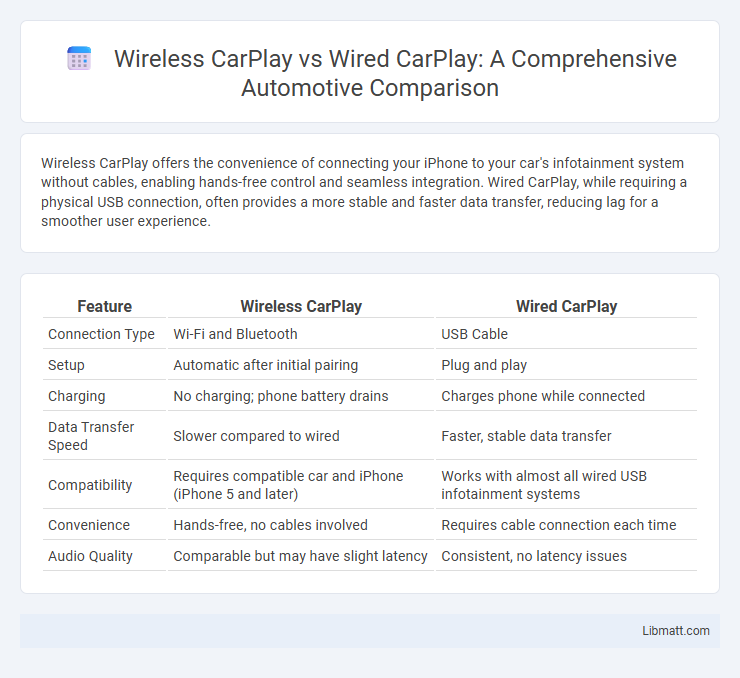Wireless CarPlay offers the convenience of connecting your iPhone to your car's infotainment system without cables, enabling hands-free control and seamless integration. Wired CarPlay, while requiring a physical USB connection, often provides a more stable and faster data transfer, reducing lag for a smoother user experience.
Table of Comparison
| Feature | Wireless CarPlay | Wired CarPlay |
|---|---|---|
| Connection Type | Wi-Fi and Bluetooth | USB Cable |
| Setup | Automatic after initial pairing | Plug and play |
| Charging | No charging; phone battery drains | Charges phone while connected |
| Data Transfer Speed | Slower compared to wired | Faster, stable data transfer |
| Compatibility | Requires compatible car and iPhone (iPhone 5 and later) | Works with almost all wired USB infotainment systems |
| Convenience | Hands-free, no cables involved | Requires cable connection each time |
| Audio Quality | Comparable but may have slight latency | Consistent, no latency issues |
Introduction to CarPlay: Wireless vs Wired
CarPlay enables seamless integration of your iPhone with your vehicle's infotainment system, providing access to navigation, music, and messaging through either a wired or wireless connection. Wireless CarPlay offers the convenience of a cable-free experience using Wi-Fi and Bluetooth, while Wired CarPlay ensures a stable, high-speed connection via a USB cable. Choosing between Wireless and Wired CarPlay depends on your preference for convenience versus consistent performance and charging capabilities.
Key Differences Between Wireless and Wired CarPlay
Wireless CarPlay connects via Bluetooth or Wi-Fi, offering convenience and eliminating cable clutter, while Wired CarPlay requires a physical USB connection for stable performance and faster data transfer. Wireless CarPlay may experience slight latency or connectivity interruptions, whereas Wired CarPlay provides consistent audio and video quality with minimal lag. Compatibility varies by vehicle and smartphone model, with Wired CarPlay widely supported and Wireless CarPlay steadily gaining adoption.
Compatibility: Devices and Vehicles Supported
Wireless CarPlay offers seamless connectivity for newer iPhone models starting from iPhone 5 and is compatible with a growing range of vehicles from brands like BMW, Audi, and Mercedes-Benz. Wired CarPlay supports a broader spectrum of devices including older iPhones and works with nearly all vehicles equipped with CarPlay ports, ensuring widespread compatibility. Your choice depends on your device model and vehicle make, as wireless functionality requires both hardware and software support on the car's infotainment system.
Setup and Installation Process
Wireless CarPlay offers a seamless setup experience by connecting your iPhone to your vehicle via Bluetooth and Wi-Fi, eliminating the need for physical cables and enabling instant use once paired. Wired CarPlay requires connecting your iPhone to the car's USB port using a Lightning cable, which provides a stable and fast data transfer but involves managing cables. Your choice between wireless and wired setups should consider ease of installation, with wireless favoring convenience and wired delivering consistent performance without battery drain.
Connectivity and Performance Comparison
Wireless CarPlay offers the convenience of a cable-free connection utilizing Bluetooth and Wi-Fi, but it may experience occasional latency or signal interruptions compared to Wired CarPlay, which delivers a stable and faster data transfer via USB. Wired CarPlay provides superior performance with minimal lag, ensuring seamless access to apps, navigation, and voice commands even in areas with dense wireless interference. Choosing between the two depends on whether you prioritize the flexibility of Wireless CarPlay or the consistent reliability and speed of a wired connection for Your driving experience.
User Experience and Convenience
Wireless CarPlay offers enhanced convenience by eliminating the need for cables, allowing you to connect your iPhone seamlessly to your vehicle's infotainment system. The user experience is smoother with wireless connectivity, enabling easier access to navigation, music, and calls without physical restrictions. However, Wired CarPlay often provides more stable connections and faster response times, making it a reliable choice during long drives or areas with heavy wireless interference.
Audio and Call Quality Considerations
Wireless CarPlay may experience occasional audio latency and slightly reduced call quality compared to Wired CarPlay due to data transmission over Bluetooth or Wi-Fi. Wired CarPlay offers stable, low-latency connections that ensure consistent audio clarity and minimal disruptions during calls. For users prioritizing superior sound fidelity and uninterrupted communication, Wired CarPlay remains the preferred choice.
Power Consumption and Charging
Wireless CarPlay consumes more power since it relies on a constant wireless connection between your iPhone and the vehicle, leading to faster battery drain compared to Wired CarPlay. Wired CarPlay provides continuous charging through the USB cable, ensuring your device remains charged during use without additional power loss. Choosing Wired CarPlay is beneficial if maintaining battery life and uninterrupted charging is a priority during extended drives.
Security and Privacy in Wireless vs Wired CarPlay
Wired CarPlay offers enhanced security by establishing a direct, encrypted connection between your iPhone and the vehicle, reducing the risk of unauthorized access or data interception. Wireless CarPlay relies on Wi-Fi and Bluetooth, which may introduce vulnerabilities such as potential eavesdropping or man-in-the-middle attacks, depending on the vehicle's network security protocols. Ensuring your car's firmware is up to date can mitigate some wireless privacy risks, but wired connections generally provide a more secure environment for your data and communications.
Final Verdict: Which CarPlay Option is Best for You?
Wireless CarPlay offers the convenience of a cable-free connection, enhancing driver freedom and reducing clutter, while Wired CarPlay provides a more stable and faster data transfer, ensuring seamless performance without battery drain. If you prioritize ease of use and modern connectivity, Wireless CarPlay is ideal; however, for consistent reliability and minimal latency, Wired CarPlay remains the best choice. Evaluating your driving habits, vehicle compatibility, and preferences for convenience versus stability helps determine the optimal CarPlay option for your needs.
Wireless CarPlay vs Wired CarPlay Infographic

 libmatt.com
libmatt.com